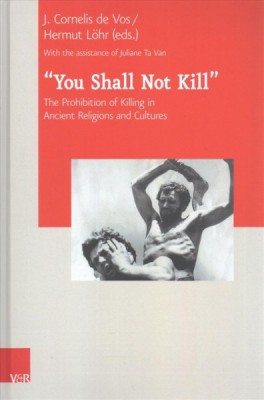| 'You Shall Not Kill': The Prohibition of Killing in Ancient Religions and Cultures Aufl. Edition Contributor(s): Lohr, Hermut (Editor), De Vos, J. Cornelis (Editor) |
|
 |
ISBN: 3525552688 ISBN-13: 9783525552681 Publisher: Vandenhoeck & Ruprecht OUR PRICE: $112.86 Product Type: Hardcover - Other Formats Published: November 2017 |
| Additional Information |
| BISAC Categories: - Religion | Biblical Criticism & Interpretation - General - Religion | Judaism - History - Religion | Ancient |
| Series: Journal of Ancient Judaism. Supplements |
| Physical Information: 1" H x 6.4" W x 9.3" (1.45 lbs) 310 pages |
| Themes: - Religious Orientation - Jewish |
| Descriptions, Reviews, Etc. |
| Publisher Description: "You shall not kill" seems to be a self-evident norm, both in modernity and in antiquity. But what does this prohibition exactly mean? Does it only apply to humans or also to non-human beings? And what about indirect or unintentional killing? Is killing legitimate under certain circumstances? The prohibition of killing was most likely a prohibition of homicide, in its original context of the Decalogue (Exod 20:13 and Deut 5:17). However, as we all know, many other texts in the Bible refer to killing humans. Moreover, killing others in war or death penalty for capital crimes does not seem to be problematic in the biblical world. Sometimes God seems to be someone, for whom people should be killed for or who wants or orders others to be killed. In a few cases, it is God him/herself who appears as the one who kills. On the contrary other opinions like humans being created in the image of God (Gen 1:26-27; 9,6) making them "god like," which implicitly prohibits killing them, or the general prohibition of killing "You shall not kill" in the Decalogue, are articulated in the Bible. The central question of this volume is whether and how biblical and non-biblical killing prohibitions function as a norm in antiquity. The contributors stem from different research fields such as ancient law, Hebrew Bible/Old Testament, New Testament, ancient Judaism, ancient history, and the church fathers. The volume covers a time spanning from the Ancient Near East up to the Christian patristic era with a look forward to Martin Luther. |